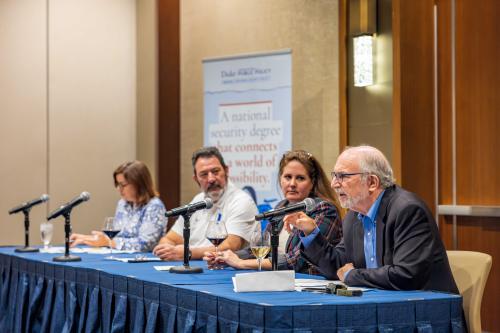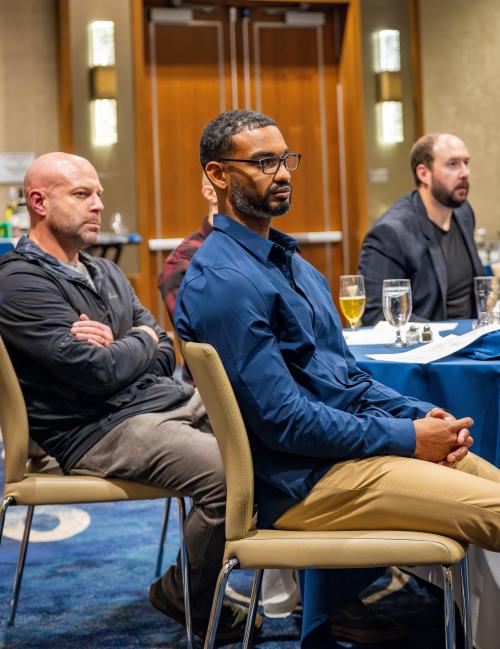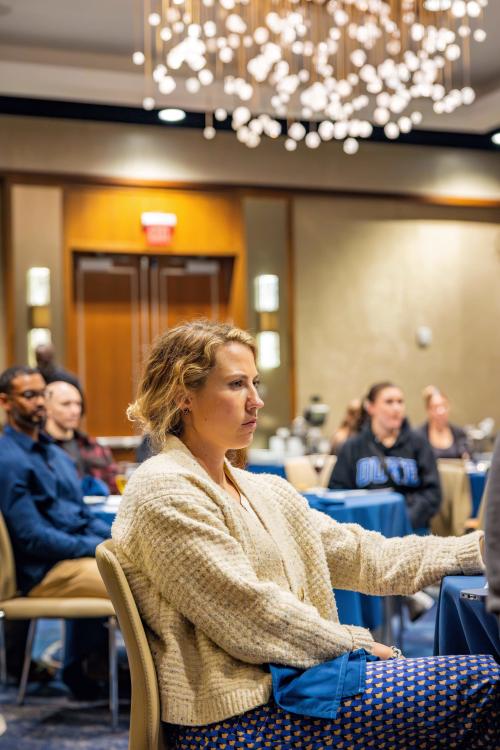
At the JB Duke Hotel, students in Duke’s Master of National Security Policy (MNSP) program continued their recent immersion weekend with a thought-provoking panel discussion on the intricacies of presidential transitions. The panel featured four distinguished experts, all of whom are also faculty members in the MNSP program: Laura Hall, a veteran of four presidential transitions; Philip Candreva, a budgeting and bureaucratic expert; Bruce Jentleson, a seasoned historian of U.S. foreign policy; and Francis Tilney Burke, a scholar specializing in public sector innovation.
As the opening session of the immersion weekend, the discussion set the tone for two days of in-person classes, activities, and opportunities for students—mid-career professionals from across the country—to connect with their classmates and faculty. Drawing on extensive firsthand experience, the panelists offered a multifaceted exploration of the challenges involved in transferring power while maintaining government continuity.

The Balancing Act of Steering the "Ship of State"
Transitions, the panelists emphasized, are about more than implementing new policies; they are a delicate balancing act of steering the "ship of state" while keeping it steady. This involves understanding how government functions—how to secure authorities, funding, and resources—and navigating the logistical hurdles that come with juggling two budgets at once. The process can be grueling, especially with tight deadlines, and first-year budgets are frequently delayed by more than 50 days.
Lessons from History
Historical reflections highlighted how fragile the process can feel, even as the system holds. The chaotic 2000 election, with its weeks of uncertainty, served as a reminder of this vulnerability. In contrast, the Clinton administration’s 1992 transition offered a more optimistic example, with its bipartisan collaboration on key initiatives standing in stark contrast to the hyper-partisanship of more recent transitions.

Panelists also recounted the challenges of onboarding political appointees with limited government experience, as seen in the Trump administration’s 2016 transition. For many, the experience was disorienting, as they faced the daunting task of creating entirely new policy frameworks from scratch. This raised fundamental questions about what an "America First" foreign assistance strategy could even look like and how to operationalize it.
The Role of Career Civil Servants
The conversation turned to the role of career civil servants, described as the backbone of governance, ensuring continuity while political appointees learn the ropes. Yet, transitions—particularly those marked by sharp ideological shifts—can strain morale within the bureaucracy. Frequent changes in direction can create disincentives for young professionals to pursue long-term public service, as the constant upheaval makes a 20- or 30-year career in government a tough sell.

At the same time, shorter stints in government can bring fresh energy and innovation, offering new perspectives to complement the stability provided by career officials. Balancing these dynamics—periodically infusing bureaucracies with fresh ideas while maintaining institutional continuity—is a challenge that requires careful management.
The Controversy of Schedule F
Discussion also touched on the controversial Schedule F initiative, which proposes reclassifying many civil service roles as political appointments. Concerns were raised about its potential to undermine the nonpartisan nature of the civil service, making it harder for agencies to function effectively. However, there was skepticism about the feasibility of implementing such sweeping changes, even within a more organized administration.
The Vice Presidency and Its Role in Transitions
The vice presidency emerged as another focal point, particularly in the context of a potential second Trump administration. Historically, vice presidents have taken on specific portfolios, such as energy policy or foreign affairs. In this context, the vice president might focus on national security, border defense, or other pressing issues, though the role would need to be carefully managed to align with a president unlikely to share the spotlight.
Security Clearances and Early Diplomatic Engagements

Security clearances and early diplomatic engagements added further layers to the discussion. Clearance processes for political appointees often become points of tension, especially when sensitive information is involved. Premature diplomatic engagements, like those seen in past transitions, can undermine the credibility of an incoming administration. The panel emphasized the importance of adhering to the principle that there is only one president at a time, cautioning against premature promises or actions that could create complications down the line.
Reflections on Transition Resilience
In their closing reflections, the panelists acknowledged the inherent messiness of transitions but emphasized their critical role in safeguarding continuity. Transitions may be fraught, but they work because the bureaucracy adapts and the country moves forward.
For MNSP students, the discussion underscored the high stakes of their work, offering a powerful introduction to the weekend’s classes and activities. Transitions are not just about shifting leadership; they are about ensuring the stability that underpins effective governance.
